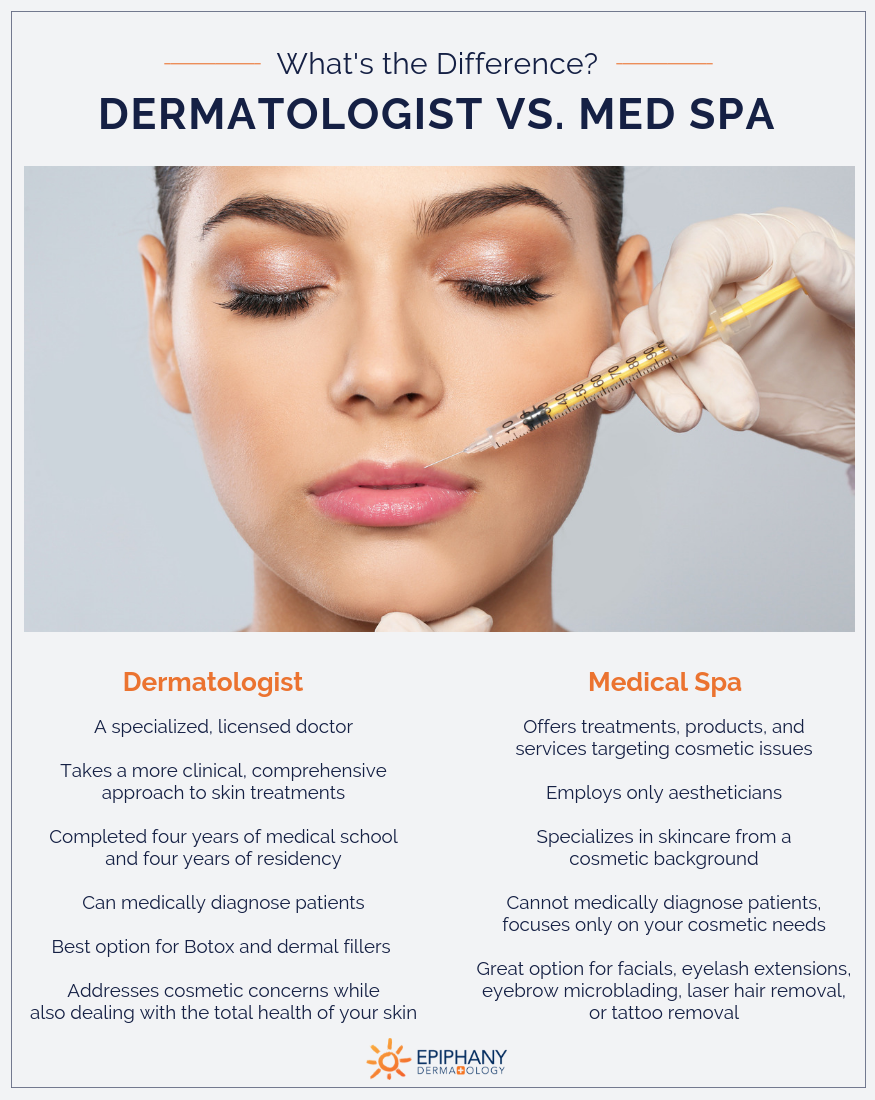A skin care specialist, also known as an esthetician, provides beauty-related treatments, while a dermatologist is a medical doctor specializing in skin health, including the diagnosis and treatment of skin diseases. Skin care specialists focus on cosmetic skin treatments such as facials, microdermabrasion, and skincare advice. “What is the Difference between Skin Care Specialist And Dermatologist”
Navigating the world of skin health can be daunting with various expertise in the field. A skin care specialist’s realm encompasses enhancing the skin’s cosmetic appearance through non-invasive techniques. They work in spas and beauty salons, offering services tailored to improve skin tone, texture, and general appearance.
Contrarily, dermatologists have an extensive medical background, having completed medical school and residency programs. Their expertise allows them to tackle complex skin issues, prescribe medication, perform surgeries, and address concerns ranging from acne to skin cancer. Understanding the key distinctions between these professions ensures individuals seek the right type of care for their skin concerns, optimizing their health and well-being.

Credit: www.epiphanydermatology.com
Decoding Professional Roles
Understanding the difference between skin care specialists and dermatologists is key. They each play unique roles in skin health. Let’s explore their core responsibilities and medical authority.
Core Responsibilities Of Skin Care Specialists
Skin care specialists focus on maintaining and enhancing skin’s appearance. They are also known as estheticians. Here are their main duties:
- Evaluate clients’ skin condition.
- Recommend skin care products and routines.
- Perform treatments like facials, exfoliations, and wraps.
- Provide guidance on make-up application.
- Tackle minor skin issues like dry skin or acne.
Medical Authority Of Dermatologists
Dermatologists are medical doctors specializing in skin. They treat a wide range of skin disorders and diseases. Below are their key responsibilities:
| Task | Description |
|---|---|
| Diagnose | Identify skin diseases, like psoriasis or eczema. |
| Prescribe | Offer medications or treatments for skin conditions. |
| Perform Surgery | Conduct surgical procedures for severe skin issues. |
| Provide Expert Care | Handle chronic skin problems or skin cancer. |

Credit: issuu.com
Educational Paths Compared
Choosing a career in skin health involves distinct educational routes. Understanding the difference is key. Let’s explore the paths to becoming a Skin Care Specialist versus a Dermatologist.
Training For Skin Care Specialists
Skin Care Specialists, also known as estheticians, embark on a journey focused on cosmetics and non-medical skin treatments. Their educational pathway typically includes:
- Enrolment in an esthetician program, which may last a few months to a year.
- Hands-on training on facials, waxing, and skincare products.
- State licensing exams after completing required course hours.
This path equips them with the know-how to enhance skin’s appearance through various treatments and beauty regimens.
Becoming A Dermatologist: A Lengthier Journey
Dermatologists are medical doctors specializing in skin, nails, and hair. Their extensive training involves:
- Completing an undergraduate degree, often with a focus on biology or sciences.
- Attending medical school for four years to earn a Doctor of Medicine (MD) or Doctor of Osteopathic Medicine (DO) degree.
- A minimum of three years in a dermatology residency program, gaining experience in patient care and complex medical procedures.
- Passing a board certification exam to practice dermatology.
Becoming a dermatologist is a rigorous and lengthy process. It prepares them for the medical and surgical aspects of skin care. They treat a wide range of skin diseases and conditions.
Scope Of Practice
The ‘Scope of Practice’ defines what a professional can do in their job. It is like a list of services they are trained for. Skin care specialists and dermatologists have different lists. People often mix them up. Let’s clear this up with a closer look at each profession.
The Aesthetic Focus Of Skin Care Specialists
Skin care specialists, also known as estheticians, have a practice bound by beauty treatments.
- Facial treatments: They clean and improve face health
- Massage: They do this to make skin look better.
- Hair removal: They remove unwanted hair with wax or lasers.
- Makeup application: They teach how to put on makeup.
They need a license in skin treatments but they cannot treat diseases.
Dermatologists: Experts In Skin Health And Disorders
Dermatologists are doctors for the skin. They can do what skin care specialists do and more.
- Diagnose skin diseases: They find and name skin problems.
- Prescribe medicine: They can give drugs for skin issues.
- Perform surgery: They can operate for skin health.
- Treat chronic conditions: They handle long-term skin diseases.
Dermatologists train for many years. They know all about skin health and disorders.
Workplace And Employment Settings
Knowing where skin care specialists and dermatologists work helps you understand their roles. The settings they work in shape their daily tasks. Let’s dive into their workplaces:
Varied Venues For Skin Care Specialists
Skin care specialists find jobs in diverse locations. They tend to work in settings focused on appearance rather than medical treatments. Here are common workplaces:
- Spas: Offering facials and skin treatments for relaxation.
- Salons: Providing a range of beauty services.
- Retail stores: Assisting customers with skin care product choices.
- Beautique clinics: Combining beauty and some clinical treatments.
These places highlight the aesthetic side of skin care, focusing on appearance and pampering.
Clinical Environments For Dermatologists
Dermatologists work in medical settings. They focus on skin health and diseases. Their offices are equipped with advanced tools for diagnosis and treatment. Usual workplaces include:
| Workplace Type | Description |
|---|---|
| Private Practices | Own or join a practice treating a range of skin issues. |
| Hospitals | Work in a specialized department caring for more acute conditions. |
| Academic Institutions | Teach future dermatologists and conduct research. |
| Research Clinics | Focus on developing new skin care treatments and medications. |
Clinical environments are where dermatologists fight skin diseases and work on patient care.
Navigating Patient Concerns
Navigating Patient Concerns means understanding when to seek help for skin issues. Skin care specialists and dermatologists play different roles in skin health. It is crucial to know which professional to visit based on your skin needs.
When To Visit A Skin Care Specialist
Consider a skin care specialist for routine skins care and minor skin issues. Common reasons to book an appointment include:
- Facials and cleansing treatments: To refresh the skin.
- Advice on skin care products: They guide on the best products for your skin type.
- Non-medical skin treatments: Such as microdermabrasion and chemical peels.
Conditions That Require A Dermatologist
Visit a dermatologist for medical assessment and treatment of skin conditions. Seek a dermatologist for:
| Condition | Description |
|---|---|
| Acne: | Persistent or severe cases that do not respond to over-the-counter treatments. |
| Eczema: | Chronic skin condition requiring medical intervention. |
| Skin cancers: | For diagnosis, treatment, and ongoing monitoring. |

Credit: www.healthline.com
Collaborative Efforts For Skincare
The journey to radiant, healthy skin is often a collaborative one, bridging the expertise of a skin care specialist and a dermatologist. Understanding their distinct roles and how they can work together is key to achieving the best results. Let’s dive into the synergistic relationship these professionals share in the realm of skincare.
Referrals And Partnerships
The bond between skin care specialists and dermatologists often begins with a referral. Skin care specialists, such as estheticians, focus on the aesthetics of skin. They provide treatments like facials, extractions, and advice on skincare products. When a client’s needs go beyond their scope, skins care specialists refer them to a dermatologist, a medical doctor specializing in skin health.
- Estheticians identify skin issues that require medical attention.
- Dermatologists diagnose and treat skin diseases and conditions.
Comprehensive Care: A Team Approach
A team approach to skincare ensures comprehensive treatment. Jointly, skin care specialists and dermatologists create a robust care strategy. They consider all factors from lifestyle habits to medical history. Their collective expertise offers personalized skincare regimens that promote long-term skin health.
| Skin Care Specialist | Dermatologist |
|---|---|
| Customized facial treatments | Medical assessments |
| Product recommendations | Prescription treatments |
| Beauty and wellness advice | Surgical procedures |
Frequently Asked Questions Of What Is The Difference Between Skin Care Specialist And Dermatologist
What Qualifications Do Skin Care Specialists Have?
Skin care specialists, also known as estheticians, typically hold a license in cosmetology or esthetics. They undergo specialized training in skins care treatments, product knowledge, and customer service. Their education focuses on beauty and skins care techniques, not medical treatments.
How Do Dermatologists Treat Skin Issues?
Dermatologists are medical doctors who diagnose and treat a wide range of skin conditions. They perform medical procedures and prescribe medications. Treatments can include surgical interventions, laser therapy, and topical or systemic drugs, according to the specific skin issue.
What Services Do Skin Care Specialists Provide?
Skin care specialists offer cosmetic skin services like facials, body wraps, and exfoliations. They help clients with skins care routines and recommend products. Their services focus on improving the appearance and texture of the skin rather than treating medical conditions.
Can A Dermatologist Perform Surgery?
Yes, dermatologists are qualified to perform skin surgeries. They tackle medical conditions like skin cancers, cysts, and moles. Dermatological surgery can range from simple mole removals to complex reconstructions after skin cancer removal.
Conclusion
Deciding between a skin care specialist and a dermatologist hinges on individual needs. Skins care experts excel in routine care and beauty treatments. Dermatologists address medical issues, offering specialized diagnoses. Choose wisely for optimal skin health, tailoring the decision to your unique skin journey.









Leave a Reply